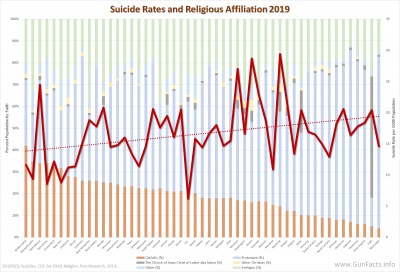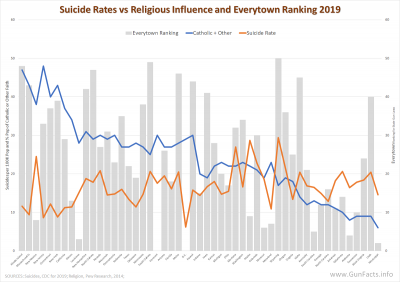Gun Deaths and Religion
I once joked that San Francisco was “spiritually horny.” It is true, being the birthplace of the Church of Satan, home of Jim Jones, and containing the largest concentration of upper-middle-class white Buddhists on the planet.
And a lot of Catholics. Between the Spanish missions and a flood of Irish, you often can tell how many miles you have driven in California by how many Catholic churches you have passed.
It also explains California’s low “gun death” rate.
Takeaways
- Religious affiliation changes suicide statistics
- Places with higher percentages of Catholic and non-Christian congregants have fewer suicides.
- Since guns are a favored American means of suicide, this ripples into lower gun suicide rates and thus lower “gun death” rates.
The Culture Clues
Culture is the major determinant variable for violence, including violence upon oneself.
In our book “Guns and Control”, we made the following cultural comparison:
Last time I checked, the annual NRA convention was about seventy thousand members. These are people that own guns and know how to use guns. They are in a confined space with lots of guns. But nobody gets killed. Now, take seventy thousand garden variety street gang members and put them into the same building with the same stockpile of guns. You’ll need plenty of mops and buckets to clean up the blood.
There are quite a few variables between these groups, but culture is the most pervasive. NRA members are largely “law and order” types. Street gang members have little or no respect for any law, and from crime statistics, no respect for gun laws. Two heavily armed groups, but with very different cultural norms, produce two very different outcomes.
There are cultural differences concerning suicide as well. It is almost unheard of in Peru and shockingly common in Lithuania. Different places, different people, different cultures.
That is why California’s “gun death” rate is low – because their suicide rate is low (regardless of means). Since guns are America’s most popular way of exiting life unassisted, it means that California’s gun suicide rate is low… which lowers its “gun death” rate. We noted before that California’s gun homicide rate is marginally below average and tied with Colorado (gun control lite) and Kansas (nearly none).
The unanswered question is, “What cultural elements might explain California’s (or any state’s) lower suicide rates, and thus ‘gun death’ rates?”
Religion is consecrated culture. Each religion attempts to instill a set of values in its followers. In some religions this includes very specific notions about suicide.
This came to our attention on Twitter, an anti-social hellscape. We had noted that Massachusetts had an admirably low suicide rate, which explained their low “gun death” rate. Another tweeter replied, “That’s because it is a heavily Catholic state.”
Such are the seeds of research.
Is Faith a Factor?
One’s beliefs guide one’s actions, and thus one’s religious beliefs guide, as well.
Different religions have different precepts about suicide (and there is no single guiding theory among atheists). The Catholic catechism has an entire half page on the subject, and the bluntly stated rule is that thou shall not off yourself. Discussions with Catholic relatives and a local priest confirm suicide has an outsized place in the faith. As such, it would be rational to think suicide rates among Catholics would be lower than Protestants or atheists (we’ll get to other sects next).
It is a fact. One study 1 reports that crude suicide rates per 100,000 people were 39 for atheists and agnostics, 28 for Protestants and less than 20 for Catholics. That is nearly a 2:1 ration between the top (faithless) and the bottom (Catholic). Pew Research 2 noted that 50% of white Catholics who attend Mass at least weekly say suicide is not a moral right under any circumstance.
A rational test, then, is to see whether suicide rates (and thus gun suicide rates) fall in states where faith is statistically at play.
Eternal Incentives
Looking at just Catholics for the moment, we see there are:
- 23 states where the percent of Catholics in the population is higher than the national average.
- 15 of those states (65%) have lower suicide rates than the national average.
|
Based on just one religion, there is a visible skewing of suicide rates. When we throw in the other major American faiths and the irreligious as well, we see patterns emerge.
The data gets quite compelling when we focus our statistical microscope.
The table tells us that for some faiths (i.e., Protestants) there is no correlation at all between their religion and the likelihood of them committing suicide. But the Catholic faith and the hopelessly vague “Other” amalgamation of Native America, Middle Eastern and Asian faiths have a slightly stronger correlation still.
Which gets us back to California.
California is #7 down the list of states by Catholic population. They are #4 for “other,” which speaks to their immigrant residents and heritages (only New York, New Jersey and Hawaii have higher concentrations). Thus, from a purely faith-driven aversion to suicides, California has a low suicide rate – 11.2 suicide victims per 100,000 people in Cali verses 14.5 for nationwide, or about 23% less.
Given that suicides are about 60% of all “gun deaths,” this faith factor, more than gun laws, explains why California politician brags are bogus.
Have Faith in Data
“But, our gun control laws….”
Could they have an effect? Let’s recap:
- Suicides are 60–66% of “gun deaths,” depending on the year.
- California (and other states) have lower suicide rates but nominal homicide rates.
- Lower suicide rates lower the “gun death” rate because guns are a popular means.
Since California’s governor appears joined at the hip to Everytown (a gun control advocacy group), a contrast of their state gun law rankings along with state-level religious leanings and suicide rates is valuable information.
And it doesn’t speak well for claims made by smug governors. As the rate of two religious groups (Catholics and “other”) drop, suicide rates rise. But there is no correlation (positive or negative) for Everytown’s state law rankings (which oddly omit Washington, DC and Vermont) and suicide rates. The R2 correlation between Everytown’s favored gun laws and suicides is a measly 0.02, which is basically no correlation at all.
Your attitude about suicide has a strong bearing on whether you would actually off yourself, including whether you used a gun to do so. It thus affects state-level suicide rates and that misleading amalgamation called “gun deaths.”



Comments
Gun Deaths and Religion — No Comments
HTML tags allowed in your comment: <a href="" title=""> <abbr title=""> <acronym title=""> <b> <blockquote cite=""> <cite> <code> <del datetime=""> <em> <i> <q cite=""> <s> <strike> <strong>